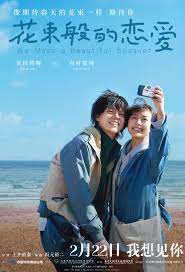
WE MADE A BEAUTIFUL BOUQUET
Japan, 2021, 124 minutes, Colour.
Masaki Suda, Kasumi Arimura.
Directed by Nobuhiro Doi.
This is a Japanese story, a Japanese romance, very much of the 21st-century, a focus on young adults, a film for a young adult audience who appreciates the contemporary references to arts, entertainment and social media.
While the film opens in 2020 with a symbolic discussion about two people sharing earphones to listen to music and the point made that each hears different aspects of the same music. As the film goes back and we follow the story of two young people who met on a chance encounter in the rain, missing the train, we realise that this is what is happening to them, bonding together but perceiving life from their particular earphone.
The film goes back to 2015, indicating the progress of the relationship year by year. The film also uses the device of showing the same episode from the point of view of each of the characters, their interpretation, inviting the audience to agree with both or, perhaps, prefer to respond to a particular perspective of one.
The performances are joyful, the characters emerging from a certain younger shyness to a great bonding, shared contemporary culture, theatre, movies, television, social media, particular authors, particular personalities.
As they grow older, the demands of life, a sense of responsibility, become very important, it is interesting how the film shows the response of each, the young woman studying, getting a responsible job, but wanting something in which can be more per personally involved. The young man, on the other hand, finding it hard to get a job after many interviews, drawn into business, becoming more and more involved, his time, interests and energies, travel, meals…
With the consequent falling apart of the relationship, he wanting to propose but his idea of marriage very traditional, not acceptable to her.
A beautiful bouquet – but only temporary.
- A Japanese story? A story of young Japanese in the 21st-century? For a young audience?
- The Japanese settings, cities, apartments, restaurants, workplaces, business, events management? Realistic settings? The musical score?
- The title, with reference to Mugi and Kinu? The time of making the bouquet? The aftermath?
- The opening, 2020, the restaurant, the couple with the earphones, sharing the earphones, the music, and the comment about each hearing a different perspective of the music because of the limit of one ear phone? This is a symbol of what happened with the couple?
- The device of going back into the past, showing the couple year by year?
- The accident of their meeting, the social, the rain, missing the train, passing the night, the next morning? Encountering each other again?
- Kinu, very young, prospects, lack of experience, family? Mugi, same age, more reclusive, attractive? The potential for a couple?
- The emphasis on contemporary media, theatre, the movies, social media, games, the details in the screenplay for younger audiences to identify with and believe?
- Their time together, getting to know each other, friends, the decision to live together, the bonding between them?
- The passing of the years, teens into their 20s, the shared interests, but the challenge to do something more?
- Kinu, her studying, achievement, accountancy, the job in the hospital, efficient, her wanting something more, the invitation to managing events, the sequences, her success?
- Mugi, being urged to take responsibility, to earn money, his range of interviews, not being employed, finally being accepted, his training, his response, with those on higher levels, the demands, his commitment to his work, the affected home, travel, meetings, meals, phone calls?
- The film’s device of the voice-overs, showing the same episodes from the point of view of each? Audience sympathies moving from one to the other? More appreciation for Kinu and her emotional experiences? Less appreciation for Mugi and his being caught up with the demands of his work?
- The consequences for the relationship, that life, the sexual relationship? The issue of marriage, Mugi and his wanting to marry, his conventional image of marriage, his job, children, Kinu at home?
- The sadness of the breaking down of the relationship, the scattering of the leaves of the bouquet, each of them finding a new partner, and the rueful encounters and memories of the past?